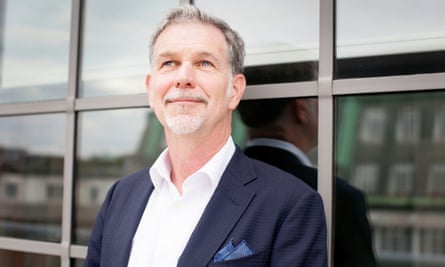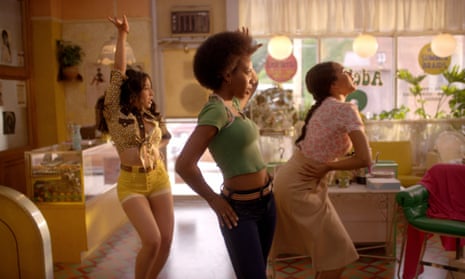“I joke with Larry Page that his vision is of making the world more productive ... and mine is making it in some ways less productive,” says Reed Hastings, over a half pint in a bar in London’s Soho. The Netflix chief executive may not have achieved the same kind of global dominance as Page’s Google, but there’s evidence he’s having an impact on productivity levels, at least in the UK.
The day before we meet, regulator Ofcom revealed that 23% of people in the UK said they had watched Netflix in the previous week, up from 13% a year and a half earlier. “That’s a start, but that’s 77% not using it,” says Hastings. “So we’ve a long way to go to reach the ubiquity that’s important for a cultural phenomenon. We are making good progress.”
However, Netflix has already become a cultural phenomenon, not least through both popularising the binge watch and creating a new euphemism, “Netflix and chill”. It is also dominating water-cooler conversations about TV. The summer’s word-of-mouth hit has been 80s nostalgia-heavy supernatural thriller Stranger Things, and there was a buzz too about last week’s launch of Baz Luhrmann’s hip-hop history The Get Down.
Not that we know how many people actually watch the shows, because Netflix won’t tell anyone. In contrast to most traditional TV channels, the information doesn’t need to be given to advertisers (because Netflix doesn’t have any) and, in any case, the raw numbers are less important than the number of subscribers each show brings in.
“It’s competitive information. It tells HBO what kind of shows to produce,” says Hastings. “Because we don’t have advertising chopping up the content, we are under a whole different model where we get the freedom to not compare all the shows and rank all the shows. Because it kind of doesn’t matter what everyone else loves the most, it matters what you or I love the most.”
However many people are watching, chatter around Netflix will only get more intense in the UK later this year when it premieres The Crown, a multi-part biopic of Elizabeth II originated in Britain and costing a reported £100m to make. While it’s one of the more expensive shows commissioned by Netflix, the budget is just part of a $6bn (£4.6bn) pot of money the company plans to spend this year on content.
That plan has got some in the industry worried. Just a year ago, John Landgraf, chief executive of Fox-owned US network FX, said there was “too much TV” and there is talk of a dangerous bubble in spending on quality drama, with much of the blame laid at Netflix’s door. Hastings is unrepentant.

“He thinks there is too much, he can do something about it,” says Hastings of Landgraf’s comment. “He can produce less, but we are going to produce more.” Could it become unsustainable for traditional media companies to up what they pay for content under pressure from new entrants? “I’m not sure for them, they might have to cut back, but we are going to grow. It’s sustainable because the new content helps us grow ... I’m not sure about in their model, if they are complaining about it they can fix their side, our side is working fine.”
Netflix is not the only new player in town pushing up prices, and when it came to the show being made by the former Top Gear trio Jeremy Clarkson, James May and Richard Hammond the company was outbid by someone with far, far deeper pockets, Amazon’s Jeff Bezos. A Netflix executive last year said Amazon had spent too much, before backtracking rapidly. Is Hastings worried about losing out?
“We bid on Jeremy Clarkson’s show and they bid more,” says Hastings. “By the time they won it, we were like ‘Wow, that’s a lot of money.’ Maybe it’ll work for them, it might well. It could be a great show. You can’t tell until you’ve seen it. We lost on that one, there’s other ones we won. They are in the bidding, but so is Hulu in the US, so is HBO, we were bidding [against] Channel 4 for Black Mirror.”
“Our spending the $5bn or $6bn is a fraction of the total industry spend. If Amazon spend a couple of billion it’s in a pool that is very large when you add up all the different networks and what they are spending on scripted entertainment around the world. I use Amazon all the time – I am a Prime user, when they have a good show I’ll watch that – but my sense is that they are just one more competitor amongst many.”
That Hastings jokes with Page and competes with Bezos is not entirely surprising. Though Netflix started out as a mail order rental service, he is very much a techie. He founded software company Pure in the 90s and sits on Facebook’s board. He is also part of the Giving Pledge campaign championed by Microsoft’s founder Bill Gates and Facebook’s Mark Zuckerberg, which commits some of the world’s richest people to donate most of their wealth to good causes during their lifetime (education is Hastings’ chosen cause).
And at Netflix it is not Hastings but Ted Sarandos, the company’s chief content officer with what Hastings calls a “golden gut”, who makes the calls on which shows to buy, even if he is guided by algorithms and the occasional bit of data insight from his CEO.

Another thing Hastings shares with his tech peers is his belief in constant growth. His content costs from both original commissions and the many billions in commitments to licences for older shows will be familiar to any long-serving LA TV exec, but his faith that as long as his subscriber numbers keep growing he’ll be able to keep spending is straight out of Silicon Valley.
It’s not an unreasonable strategy, but recent numbers have disappointed. In its second quarter Netflix added just 160,000 memberships in the US and 1.52m internationally – compared with a forecast of 500,000 extra US members and 2m internationally – taking it to a total of 83 million members worldwide. The markets were unimpressed and the company’s share price dived.
“It’s been volatile since we started,” he says of the share price. “The initial thing is we went public on the dollar, within six months we were down to 50c. We are trading about where we were before earnings. Everyone realises that internet video is the future. I don’t think [the markets] are worried, but there was disappointment about us having less growth than we expected. That’s definitely true, but it’s just one quarter. The key in success is thinking long term and not worrying over one quarter.”
While growth in the US is slowing, its international expansion is doing well, and though it may not have many subscribers in Syria or North Korea, it claims to be in all but one market globally. But that market is the world’s largest, China, where it has faced the same political barriers as other western media and technology companies.
“The Chinese government just closed down the Disney movie service. And they closed down Apple’s movie service. Those are two pretty sophisticated, relative to China, companies. It looks like the government just doesn’t want the foreign content distribution. Maybe someday in the future there’ll be an opportunity for us in China, it’s possible. We are continuing to work on it.”
Another growth area often mooted for Netflix is sports and news, yet Hastings is dismissive of both. “Every incremental million dollars we spend, we want to strengthen our movies and TV shows. No to sports, and no to news. We want to do better movies and TV shows.” It’s a tactic that has worked so far, and Hastings is banking on the world’s appetite for top-notch TV being far from sated.
